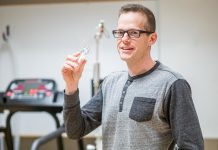A new study shows that a synthetic antioxidant can delay and prevent the onset of autoimmune diabetes in mice. The antioxidant protected insulin-producing beta cells from lethal oxygen radicals generated in diabetes. To the researchers' surprise, the antioxidant also blocked the ability of the immune system to recognize beta cells, the target of the autoimmune attack in diabetes. The findings, published by researchers at National Jewish Medical and Research Center and the University of Colorado Health Sciences Center in the February issue of Diabetes, suggest that antioxidants may be useful against diabetes as well as other autoimmune diseases and organ-transplant rejections.
"These data show that antioxidants protect against diabetes on two fronts. They not only mop up destructive oxygen radicals, but also alter the immune response," said James Crapo, M.D., co-author and Chairman of the Department of Medicine at National Jewish. "That suggests the intriguing possibility that we might one day treat a variety of autoimmune diseases by altering the oxidant/antioxidant balance of immune system."
In autoimmune, or type 1, diabetes, the immune system mistakenly recognizes beta cells as foreign invaders and initiates an attack against them. During the attack, inflammatory cells release oxygen radicals that damage beta cells and eventually cause them to die. As increasing numbers of beta cells are destroyed, the body produces less and less insulin, leading to diabetes. Approximately 1 million people in the U.S. have type 1 diabetes, and about 30,000 new cases are diagnosed each year.
The researchers used a synthetic catalytic antioxidant developed several years earlier by Dr. Crapo and his colleagues, and now licensed by Incara Pharmaceuticals Corporation. The antioxidant, dubbed AEOL 10113, mimics the naturally occurring antioxidant superoxide dismutase, but is effective against a wider range of antioxidants and lasts longer in the body.
The researchers injected AEOL 10113 into 10 mice one day before transplanting T cells that cause diabetes. Following the transplant, they gave the mice the antioxidant four more times, the last on day 9. All five control mice became diabetic by day 13. None of the mice treated with AEOL 10113 showed any signs of diabetes until day 21, and half remained diabetes-free after four weeks.
Continue Reading Below ↓↓↓
"We were surprised and pleased that the mice remained healthy for almost two weeks after the antioxidant treatments ended," said co-author Jon Piganelli, an immunologist who was working at the University of Colorado Health Sciences Center when he did the work. "That suggested to us that the antioxidant had altered the cells of the immune system."
Subsequent experiments indicated that the antioxidant can prevent the immune system from recognizing specific antigens, molecules that normally trigger an immune response. This suggests that the antioxidant could be used in combination with specific antigens to treat not only diabetes, but other autoimmune diseases.
Additional experiments will have to be done to prove the safety and efficacy of the antioxidant in animals before human trials could begin.
"Obviously we have a long way to go," said Dr. Crapo. "But we believe that these findings have opened a very promising new line of research."
This research was funded by the National Institutes of Health and the National Heart Lung and Blood Institute. Incara Pharmaceuticals provided the antioxidant.
National Jewish Medical and Research Center is a non-sectarian, non-profit institution devoted to the research and treatment of lung, allergic and immune diseases, including asthma, allergies, tuberculosis, chronic pulmonary obstructive disease, lupus and other autoimmune diseases.
The University of Colorado Health Sciences Center, located in Denver and Aurora, CO, includes schools of medicine, nursing, pharmacy, and dentistry, a graduate school and two hospitals.
Source: University of Colorado









